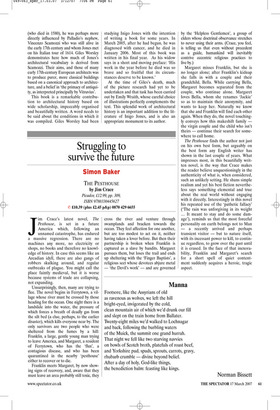Struggling to survive the future
Simon Baker
THE PESTHOUSE by Jim Crace Picador, £12.99, pp. 309, ISBN 9780330445627 ✆ £10.39 (plus £2.45 p&p) 0870 429 6655 Jim Crace’s latest novel, The Pesthouse, is set in a future America which, following an unnamed catastrophe, has endured a massive regression. There are no machines any more, no electricity or shops, no books and therefore no knowledge of history. In case this seems like an Arcadian idyll, there are also gangs of robbers skulking around, and regular outbreaks of plague. You might call the place faintly medieval, but it is worse because systems of trade are collapsing, not expanding.
Unsurprisingly, then, many are trying to flee. The novel begins in Ferrytown, a village whose river must be crossed by those heading for the ocean. One night there is a landslide into the water, the pressure of which forces a breath of deadly gas from the silt bed (a clue, perhaps, to the earlier disaster), which kills everyone near by. The only survivors are two people who were sheltered from the fumes by a hill: Franklin, a large, gentle young man trying to leave America, and Margaret, a resident of Ferrytown, who has the ‘flux’, a contagious disease, and who has been quarantined in the nearby ‘pesthouse’ either to recover or to die.
Franklin meets Margaret, by now showing signs of recovery, and, aware that they must leave an area probably still toxic, they cross the river and venture through swamplands and bracken towards the ocean. They feel affection for one another, but are too modest to act on it, neither having taken a lover before. But then their partnership is broken when Franklin is captured as a slave by bandits. Margaret pursues them, but loses the trail and ends up sheltering with the ‘Finger Baptists’, a religious sect whose devotees abjure metal — ‘the Devil’s work’ — and are governed by the ‘Helpless Gentlemen’, a group of elders whose doctrinal observance stretches to never using their arms. (Crace, you feel, is telling us that even without precedent as a guide, humankind will inevitably contrive eccentric religious practices to live by.) Margaret misses Franklin, but she is no longer alone; after Franklin’s kidnap she falls in with a couple and their grandchild, Bella. While carrying Bella, Margaret becomes separated from the couple, who continue alone. Margaret loves Bella, whom she renames ‘Jackie’ so as to maintain their anonymity, and wants to keep her. Naturally we know that she and Franklin will find each other again. When they do, the novel touchingly conveys how this makeshift family the virgin couple and the child who isn’t theirs — continue their search for somewhere to call home.
The Pesthouse finds the author not just on his own best form, but arguably on the best form any English writer has shown in the last couple of years. What impresses most, in this beautifully written novel, is the way that Crace makes the reader believe unquestioningly in the authenticity of what is, when considered, such an unlikely setting. He shuns simple realism and yet his best fiction nevertheless says something elemental and true about the real world without engaging with it directly. Interestingly in this novel his repeated use of the ‘pathetic fallacy’ (‘The rain was unforgiving in its weight ... It meant to stay and do some damage’), reminds us that the most forceful personality on earth belongs not to Man — a recently arrived and perhaps transient visitor — but to nature itself, with its incessant power to kill, to continue regardless, to grow over the past until it is erased. In the face of that inexorability, Franklin and Margaret’s search for a short spell of quiet contentment suddenly acquires a heroic, tragic aspect.


































































































 Previous page
Previous page